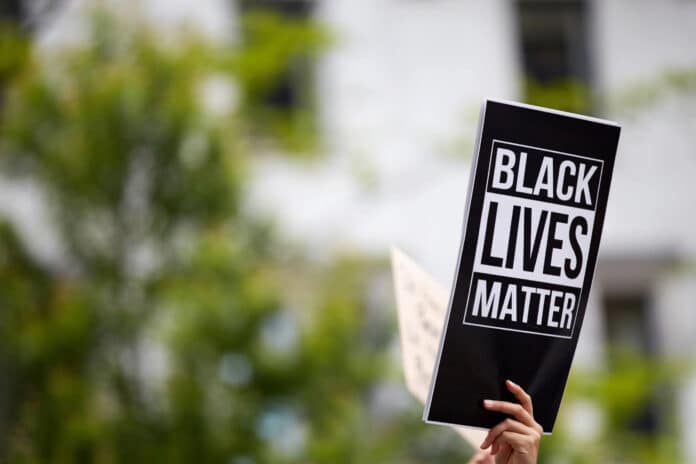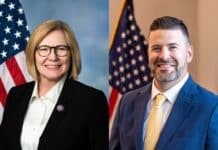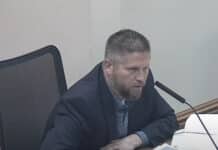
Today, we are talking about our lawsuit Cajune v. Independent School District 194. Back in 2020, in the wake of the death of George Floyd and subsequent riots and protests in the Twin Cities, teachers and community activists in Lakeville Area Schools demanded permission to hang posters endorsing the political slogan “Black Lives Matter” on the walls of school hallways and classrooms. At first, the district refused because its own policy prohibited the endorsement of one side of a controversial political issue in schools.
That initial refusal kicked off a months-long fight at school board meetings. Local activists bullied school board members at these public meetings by comparing them to Nazis and telling them that their refusal was akin to “tell[ing] your black and brown students that their lives do not matter.” These activists also bullied our clients, Bob and Cynthia Cajune, by calling them racist for simply advocating for neutrality in public schools on a hot-button political issue.
Eventually, the public pressure proved to be too much and the district caved. Starting in the spring of 2021, district staff announced a so-called “Inclusive Poster Series” which included two posters with the political slogan “Black Lives Matter.”
The poster series was designed to allow certain private viewpoints to be expressed in schools. Specifically, the superintendent at the time remarked that the goal of the posters would be to “let the teachers have the opportunity and to use these if they feel it has an instructional value or value in their classrooms … It’s really about what the classrooms and the teachers want to do.” The posters were eventually made available in a catalog for teachers to order if they wanted one.
The final design of the posters was left up to community activists. As the board chair summarized, the posters “were vetted by students, staff, community advisory groups, and others to reflect our community. Based on their reviews of the posters, recommended changes were implemented.”
Our clients wanted the same opportunity that community activists in Lakeville had. But when Bob Cajune asked for “All Lives Matter” and “Blue Lives Matter” posters, he was told by district staff that those mottos “were created specifically in opposition to Black Lives Matter” and that the District did “not approve of All Lives Matter or Blue Lives Matter posters in the classrooms or other areas of the school, and teachers/school staff are not allowed to wear shirts with these sayings to school.”
Not only is the district’s position false, but it is promoting the political views of some of its community and refusing to allow alternative messages — a classic violation of the First Amendment. That is why we filed a federal lawsuit. Unfortunately, the District Court decided that the poster series was government speech and therefore not subject to a First Amendment challenge.
The government-speech doctrine provides that when the government speaks for itself, it does not have to abide by the First Amendment and allow alternative views to be presented. A classic example are monuments in a public park. In Pleasant Grove City v. Summum, the Supreme Court held that the park was allowed to keep some religious monuments out. The reason was that permanent monuments displayed on public property typically represent the government speaking for itself. So the government could choose which messages to endorse.
But the government-speech doctrine is not limitless. In fact, the Supreme Court has explained that it is “a doctrine … susceptible to dangerous misuse … If private speech could be passed off as government speech by simply affixing a government seal of approval, government could silence or muffle the expression of disfavored viewpoints.” As a result, the Supreme Court has instructed lower courts to look at a number of factors in determining if the government is speaking for itself: the history of the expression, the public’s likely perception of who is speaking, and the extent to which the government has controlled the message.
That is why in Shurtleff v. City of Boston, the Supreme Court held that the City of Boston could not block a Christian group from flying a flag on its city hall flagpole because it allowed other private groups to fly their flags. Although governments may have historically flown flags at the seat of government to send a government message, the City of Boston had previously allowed any private group to use its flagpole. Further, the flags were not Boston’s speech because the City was not “meaningful[ly] involve[d] in the selection of flags or the crafting of their messages.” And if some private groups were allowed to fly flags, a Christian group could not be denied permission on the basis of its viewpoint.
Last month, we made a similar argument on appeal before the Eighth Circuit Court of Appeals: the poster series was requested by and vetted by private individuals, so it is not government speech, even when hung in a school.
Our senior trial counsel, James Dickey, argued that the inclusive poster series is different than the “Dare to Resist Drugs and Alcohol” posters you may remember from when you were in school. As he explained, although school districts have historically “had some messaging in their hallways, … more important is what Lakeville did prior to allowing these particular posters.” The District previously said “none of that is gonna happen here.”
The judges had many difficult questions for the district’s attorneys. After the district attempted to characterize the poster series as the district’s decision to “communicate a message of support,” Judge Raymond Gruender asked if the district “did so after rejecting, for I think a fairly significant period of time this request.”
Similarly, Judge L. Steven Grasz remarked that “I think this is a very challenging case … I see some arguments on both sides.” He then noted that the Supreme Court has advised “great caution before extending our government speech precedents.” Judge Grasz asked if there were “any cases where the Supreme Court has upheld an ideological or political message as government speech.” Counsel for the district acknowledged that the Supreme Court has not addressed that question.
Judge Grasz then asked “Could the school put up a poster that said ‘Make America Great Again’ or ‘we stand with the free Palestine movement’?” Counsel for the district claimed that there was no First Amendment restrictions on these types of overt political posters being claimed as a school district’s speech.
We look forward to receiving a decision from the Eighth Circuit in the coming months and hope to continue this important case. We stand committed to defending the First Amendment and will not tolerate government policies that intentionally silence alternative viewpoints.
LISTEN:
















